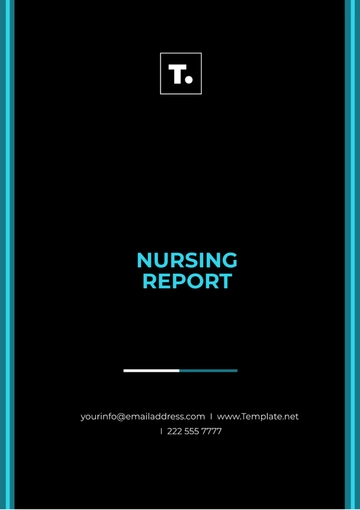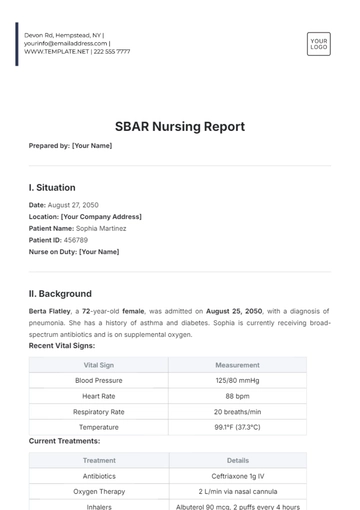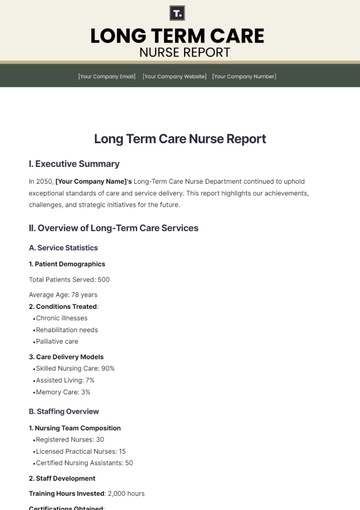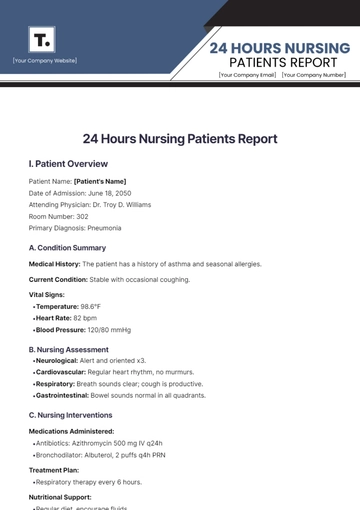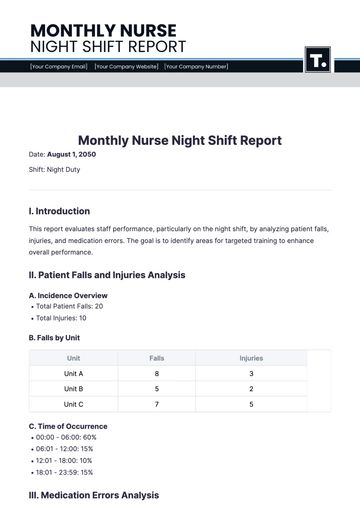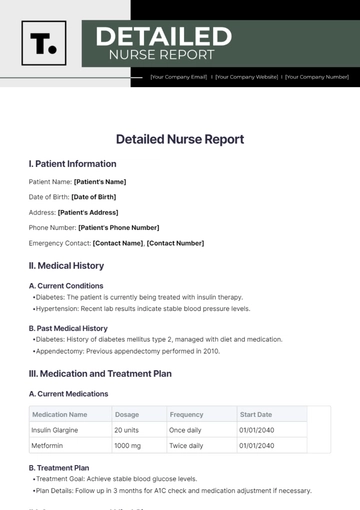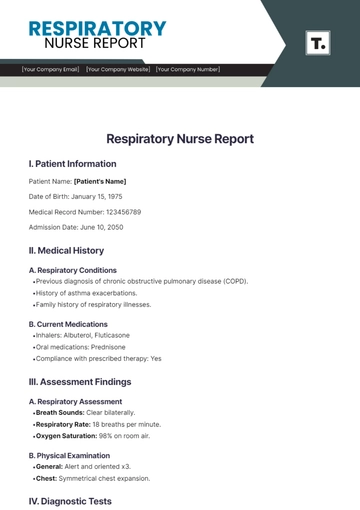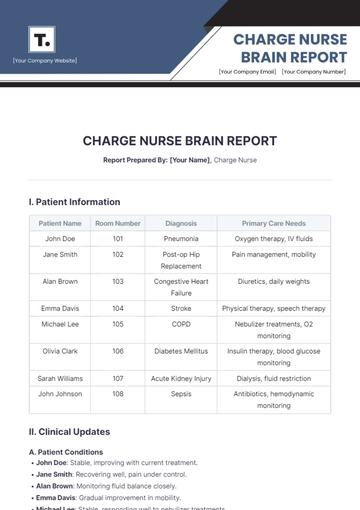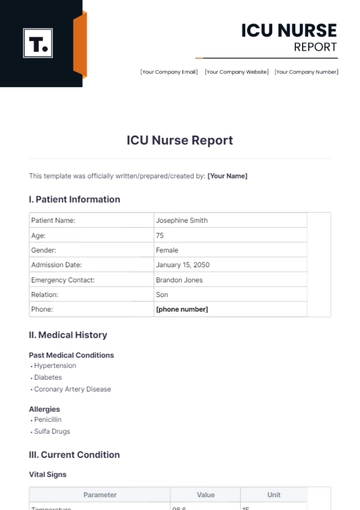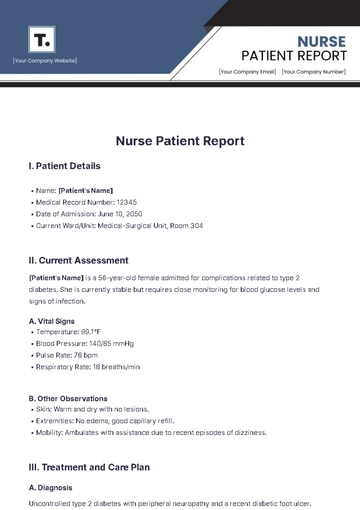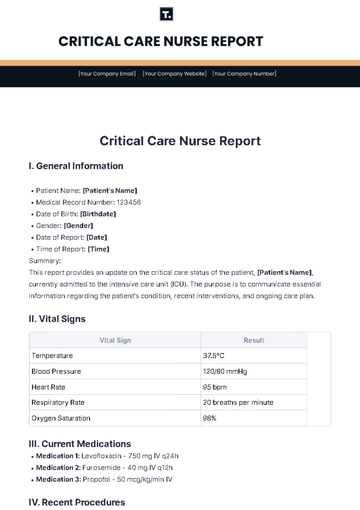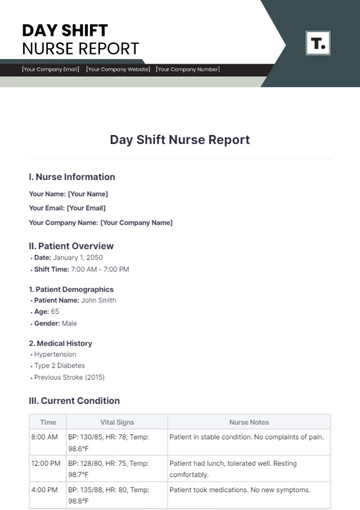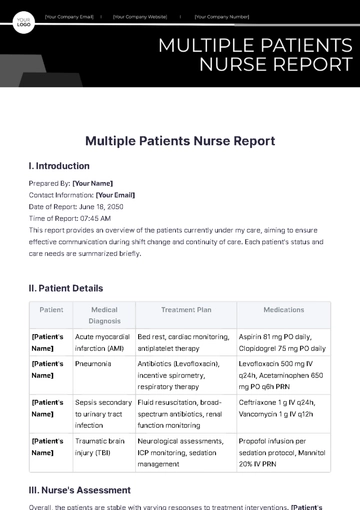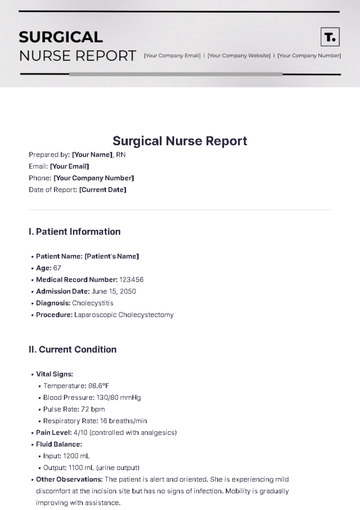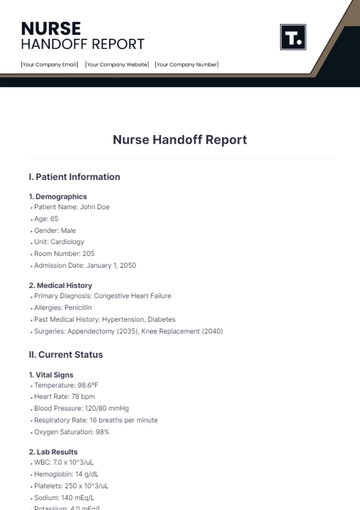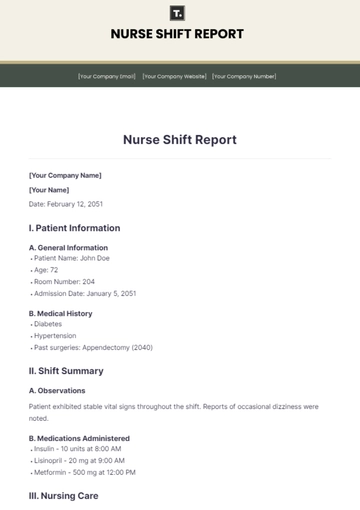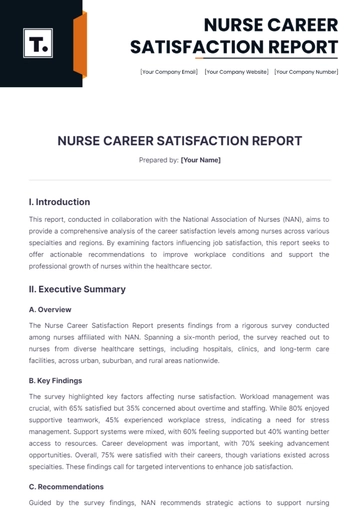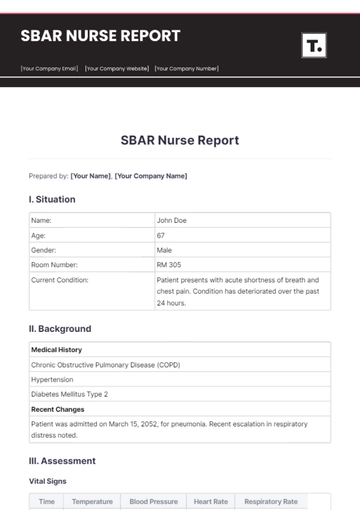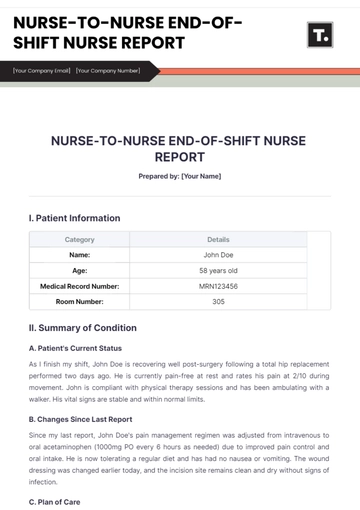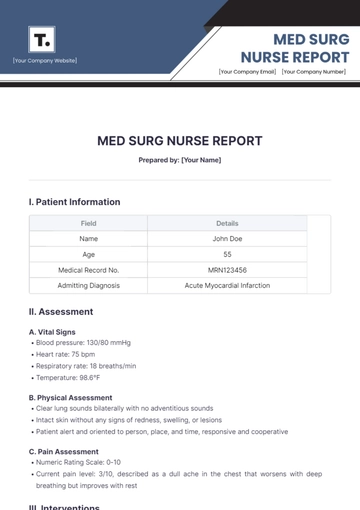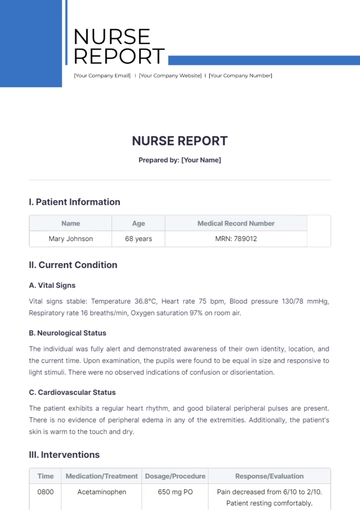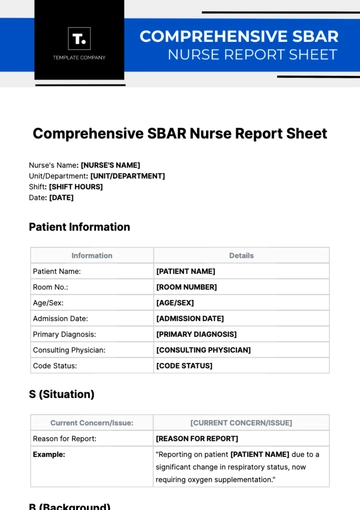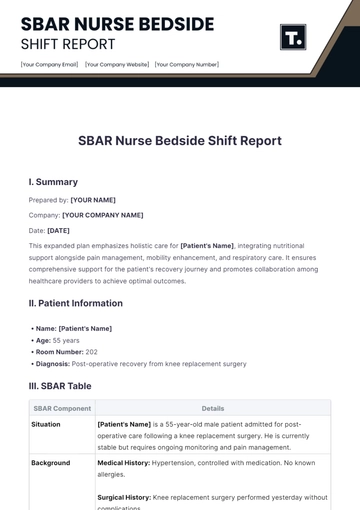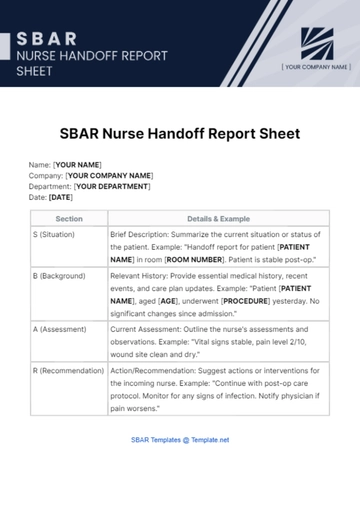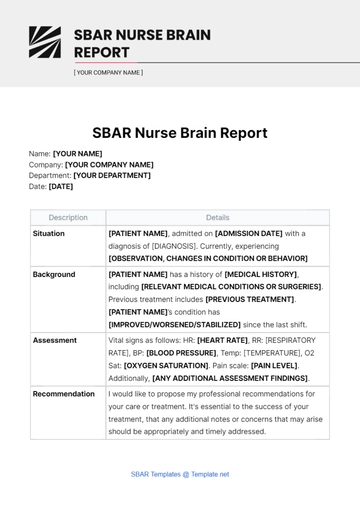Free Multiple Patients Nurse Report
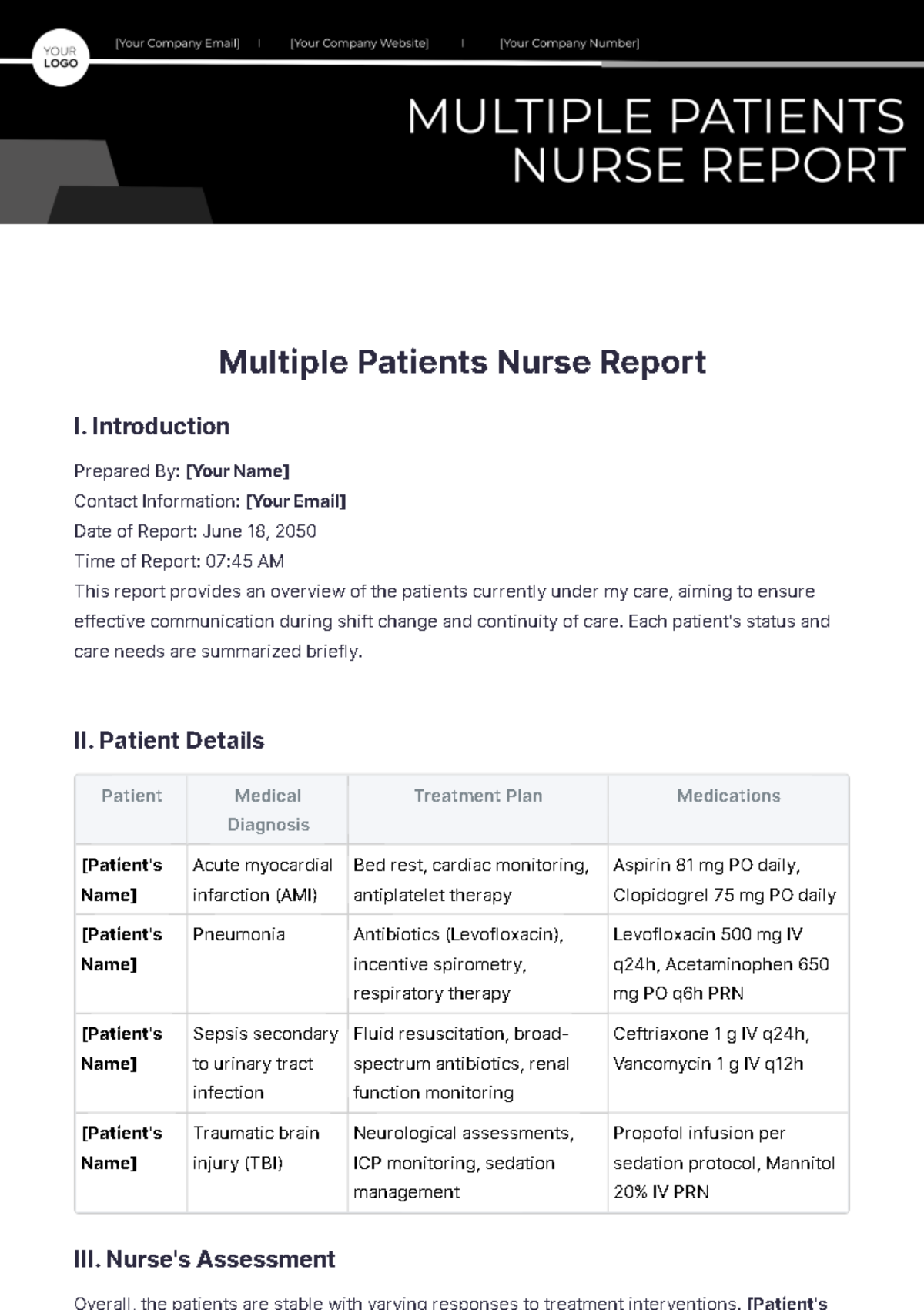
I. Introduction
Prepared By: [Your Name]
Contact Information: [Your Email]
Date of Report: June 18, 2050
Time of Report: 07:45 AM
This report provides an overview of the patients currently under my care, aiming to ensure effective communication during shift change and continuity of care. Each patient's status and care needs are summarized briefly.
II. Patient Details
Patient | Medical Diagnosis | Treatment Plan | Medications |
|---|---|---|---|
[Patient's Name] | Acute myocardial infarction (AMI) | Bed rest, cardiac monitoring, antiplatelet therapy | Aspirin 81 mg PO daily, Clopidogrel 75 mg PO daily |
[Patient's Name] | Pneumonia | Antibiotics (Levofloxacin), incentive spirometry, respiratory therapy | Levofloxacin 500 mg IV q24h, Acetaminophen 650 mg PO q6h PRN |
[Patient's Name] | Sepsis secondary to urinary tract infection | Fluid resuscitation, broad-spectrum antibiotics, renal function monitoring | Ceftriaxone 1 g IV q24h, Vancomycin 1 g IV q12h |
[Patient's Name] | Traumatic brain injury (TBI) | Neurological assessments, ICP monitoring, sedation management | Propofol infusion per sedation protocol, Mannitol 20% IV PRN |
III. Nurse's Assessment
Overall, the patients are stable with varying responses to treatment interventions. [Patient's Name], recovering post-PCI for acute myocardial infarction, shows stable cardiac enzymes and vital signs within normal limits. [Patient's Name], being treated for pneumonia, has shown resolution of fever and improved oxygen saturation on nasal cannula therapy.
[Patient's Name], managed for sepsis secondary to urinary tract infection, remains hypotensive despite fluid resuscitation and initiation of vasopressors. [Patient's Name], with a traumatic brain injury, maintains stable intracranial pressure with appropriate management of sedation and neurological assessments showing no signs of deterioration.
IV. Action Steps
Immediate Actions: Administer scheduled medications and monitor responses.
Continued Care: Coordinate with specialty teams for ongoing assessments and adjustments in treatment plans; facilitate family meetings to discuss care plans and patient progress.
Patient Education: Provide education to patients and families regarding diagnoses, treatments, and discharge planning.
Updates Needed: Communicate any changes in patient conditions promptly to the healthcare team; update families on patient progress and involve them in care planning where appropriate; document all care interventions and patient responses in the electronic health record (EHR).
- 100% Customizable, free editor
- Access 1 Million+ Templates, photo’s & graphics
- Download or share as a template
- Click and replace photos, graphics, text, backgrounds
- Resize, crop, AI write & more
- Access advanced editor
Simplify your workload with the Multiple Patients Nurse Report Template offered by Template.net. Perfect for busy healthcare environments, this template is customizable, downloadable, and printable. Editable in our AI Editor Tool, it allows nurses to efficiently manage and document care for multiple patients, ensuring thorough and organized reporting for every shift.
You may also like
- Sales Report
- Daily Report
- Project Report
- Business Report
- Weekly Report
- Incident Report
- Annual Report
- Report Layout
- Report Design
- Progress Report
- Marketing Report
- Company Report
- Monthly Report
- Audit Report
- Status Report
- School Report
- Reports Hr
- Management Report
- Project Status Report
- Handover Report
- Health And Safety Report
- Restaurant Report
- Construction Report
- Research Report
- Evaluation Report
- Investigation Report
- Employee Report
- Advertising Report
- Weekly Status Report
- Project Management Report
- Finance Report
- Service Report
- Technical Report
- Meeting Report
- Quarterly Report
- Inspection Report
- Medical Report
- Test Report
- Summary Report
- Inventory Report
- Valuation Report
- Operations Report
- Payroll Report
- Training Report
- Job Report
- Case Report
- Performance Report
- Board Report
- Internal Audit Report
- Student Report
- Monthly Management Report
- Small Business Report
- Accident Report
- Call Center Report
- Activity Report
- IT and Software Report
- Internship Report
- Visit Report
- Product Report
- Book Report
- Property Report
- Recruitment Report
- University Report
- Event Report
- SEO Report
- Conference Report
- Narrative Report
- Nursing Home Report
- Preschool Report
- Call Report
- Customer Report
- Employee Incident Report
- Accomplishment Report
- Social Media Report
- Work From Home Report
- Security Report
- Damage Report
- Quality Report
- Internal Report
- Nurse Report
- Real Estate Report
- Hotel Report
- Equipment Report
- Credit Report
- Field Report
- Non Profit Report
- Maintenance Report
- News Report
- Survey Report
- Executive Report
- Law Firm Report
- Advertising Agency Report
- Interior Design Report
- Travel Agency Report
- Stock Report
- Salon Report
- Bug Report
- Workplace Report
- Action Report
- Investor Report
- Cleaning Services Report
- Consulting Report
- Freelancer Report
- Site Visit Report
- Trip Report
- Classroom Observation Report
- Vehicle Report
- Final Report
- Software Report
